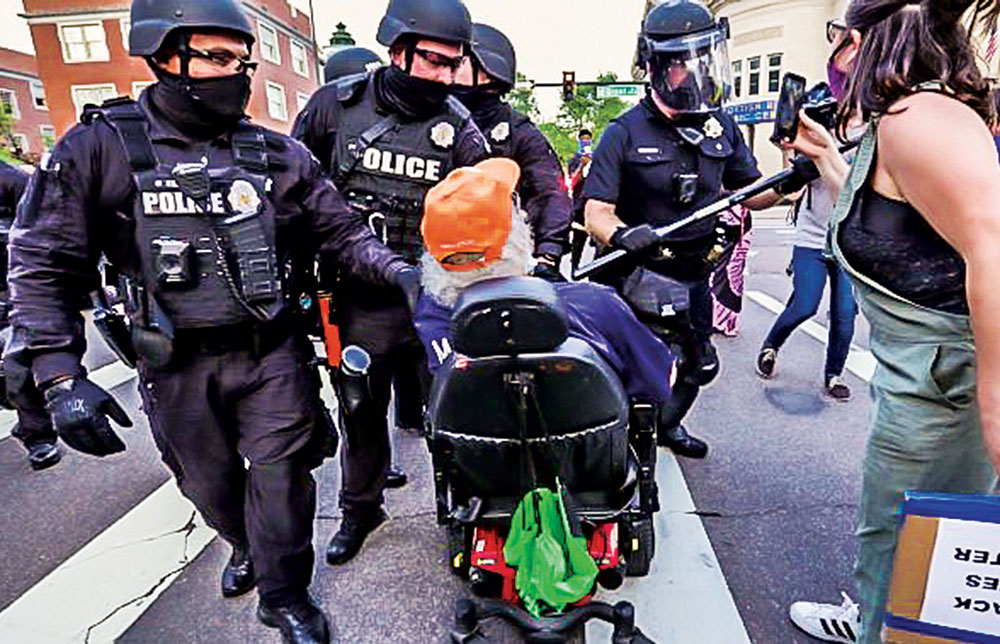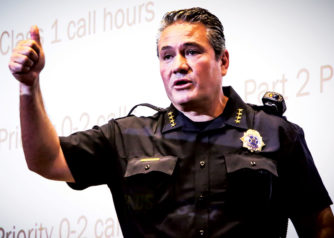
Protesters and police clash in downtown Denver during a demonstration against police brutality on Thursday, May 28, 2020. Photo by Hart Van Denburg/CPR News.
Denver Police Chief Paul Pazen held a virtual town hall on June 3 to listen to community concerns and respond to questions. The Front Porch transcribed questions from that session and edited for length and clarity.

Chief Pazen spoke at a community meeting in August 2019 following a string of 80238 burglaries.
I’m concerned at the overly aggressive response by DPD to the protest—the use of rubber bullets and the treatment of those trying to peacefully protest. How do you plan to hold police responsible for their actions?
Accountability is a big part of what we need to do to build some trust. Just like I have to hold our officers accountable for their actions I must be held accountable as well. We will absolutely have an independent review to include the Office of Independent Monitor. We certainly do not want to negatively impact peaceful protests. We must focus on the individuals that are causing harm to the people of Denver and our community.
We have to do a better job of identifying those individuals that are causing the violence or destruction and hold them accountable without negatively impacting the folks that are here to really get their voices heard.
Will you require observing officers to intervene when their fellow officers is using unnecessary force, especially when someone is already contained?
Yes, you’re right. We saw this on the video and any one of those three other officers could have intervened. We need to make sure that doesn’t happen here—that there is a duty to intervene. We see what horrific tragic loss of life can happen when officers don’t intervene in these unnecessary uses of force.
Is there a way the police can show they are not above their badge in a way that honors all people as equals?
We have to acknowledge that law enforcement historically, as well as this department and individual officers, have made mistakes. It’s about building trust, and when that trust is violated, it’s very difficult to bring it back. We must hold ourselves accountable for our actions and pledge to do better, but we certainly need the community’s help and input—and that’s what we are asking for here.
Is there any policy to remove police officers that are involved or associated with any white supremacist or racist group? If not, do you plan on implementing one?
Racism has no place in law enforcement and certainly doesn’t have any place in the Denver Police Department. When we look at not just what happened in Minneapolis and the last several days here in Denver, some of this is structural racism that impacts the criminal justice system, the public health system, and our economic system. We have to look at this in a holistic approach. But when we talk about officers that may have any kind of racist biased views, we can’t tolerate that. Together we need to make sure that those folks aren’t hired within the police department and if they are identified that they’re immediately removed.
What characteristics will you prioritize in hiring?
What’s in somebody’s heart is really something that’s difficult to measure. Identifying and hiring officers that care about people and care about their neighborhoods gives us an opportunity to do better. And it’s a way that we can get diverse backgrounds and diverse perspectives, not just from the outside but from the inside, to help change law enforcement and to change this police department. If we have folks like myself who grew up in North Denver, who you know are deeply connected to the community, you want those strong ties. People who care about our city and want to improve and who are open to learn new perspectives, those are the types of characteristics that we’re looking for in the women and men that make up the police department.
What can the Denver Police Department do to ensure they know and feel that we are being heard and that pain is also being felt?
It’s important that our department listens now. Words are just words until they become actions. Marching and talking with young leaders really helped me get a better-informed perspective on what’s taking place. I can tell you that there’s a greater level of awareness and a greater level of understanding, but this is just a start. We have a long way to go. The fact that thousands of folks from every walk of life, young old, different races, different religions, different sexual orientations are all coming together, we all need to listen to this message and be present for it. This is not just our city, this is not just our state, and it’s not just our country. They’re having similar protests across the globe. I believe this is the tipping point and we have to do better—our commitment is we’re going to be open and do better.



0 Comments